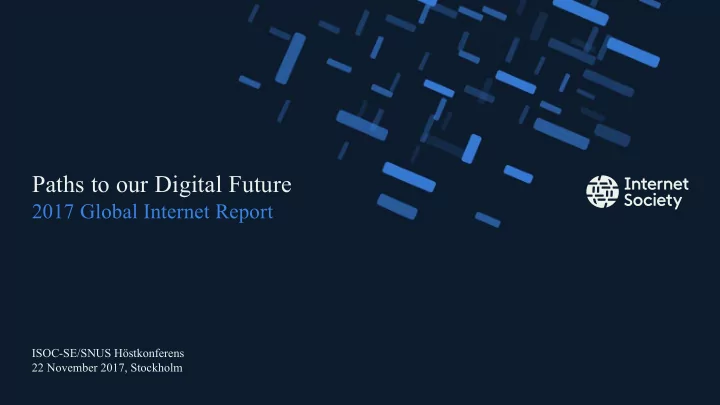

Paths to our Digital Future 2017 Global Internet Report ISOC-SE/SNUS Höstkonferens 22 November 2017, Stockholm
About the report § Launched in 2016 § Question: “How do we ensure the continued development of an Internet at the service of all people?” We did: • More than 130 in-depth interviews with Internet experts and users • Two global surveys and two regional surveys • More than 3000 responses received • Ten Internet Society community roundtables • A survey soliciting suggestions for recommendations as to future actions.
Structure of the Report Drivers of Change The six key forces that will have a profound impact on the future of the Internet in the years to come. Areas of Impact The three critical features related to the future Internet, upon which the Drivers will have a decisive impact.
Among our findings: Key take-aways • A security divide will materialize • AI and IoT will fundamentally change what it means to be online • Governments are ill equipped to respond to future challenges • Rise of nationalism present challenges • Addressing cyber threats should be the priority • Role of civil society • New thinking, new approaches and new models needed • Ethics will grow in importance
Drivers of Change Technological, economic, regulatory, security and network related challenges for the future Internet. In all cases, the implications of one The Internet and the Artificial Cyber Driver are inextricably tied to another. Physical World Intelligence Threats The Internet Networks, Standards The Role of Economy and Interoperability Governments
Among our findings: The Role of Government • The role of governments in the Internet will grow • Policies and structures will be ill-equipped to keep pace • Roles and responsibilities will continue to blur
Among our findings: Internet and the Physical World • Convergence will fundamentally change what it means to be online. • Security of connected devices must be addressed. • IoT could undermine privacy and deepen surveillance.
Among our findings: Internet Economy • We are on the verge of a technological paradigm shift • Successful anticipation of this paradigm shift will drive innovation and entrepreneurship. • Governments will be ill equipped to respond
Among our findings: Cyber Threats • Risk that online freedoms and global connectivity will take a back seat to national security. • Need for new accountability, incentive and liability models • The Internet of Things will create new security challenges.
Among our findings: Artificial Intelligence • Significant impact on the convergence between the digital and the physical world. • Ethical considerations must be prioritized • There is a high risk that the benefits will be unevenly distributed
Areas of Impact Our community identified three issue areas that are crucial for the future Internet. These issue areas also reflect the Internet Society’s fundamental belief that the Personal Freedoms Media and interests of the user and society must remain and Rights Society at the forefront of any discussion on the future of the Internet. Digital Divides
Among our findings: Digital Divides • A new security divide will materialize • Many nations may be left behind in the evolution of AI and IoT • Consolidation of networks and platforms will affect limit new opportunities
Among our findings: Personal Freedoms and Rights • AI and IoT will increase the potential for a “surveillance society” • Government measures may increasingly undermine personal rights and freedoms. • Users will lose trust in the Internet due to cyber threats
Among our findings: Media and Society • Automation-driven changes will cause considerable anxiety about the future of work • Rising concerns about fake news and disinformation • Roles and responsibilities will continue to blur
Recommendations Guided by a core set of values: • The Internet must be global, open, and secure. • Decisions about the Internet’s future must be inclusive and multistakeholder. Objective: Actionable set of recommendations
Ten things to move forward • Human values must drive technical development and use • Apply human rights online as well as offline. • Put users’ interests first with respect to their own data • Act now to close digital divides. • Make the Internet economy work for everyone. • Take a collaborative approach to security. • Increase accountability of data handlers • Build strong, secure, resilient networks. • Address the need for online social norms. • Empower people to shape their own future.
Thank you. #shapetomorrow Visit us at Galerie Jean-Malbuisson 15, 1775 Wiehle Avenue, www.internetsociety.org CH-1204 Geneva, Suite 201, Reston, VA Follow us Switzerland. 20190-5108 USA. @internetsociety +41 22 807 1444 +1 703 439 2120 17
Recommend
More recommend